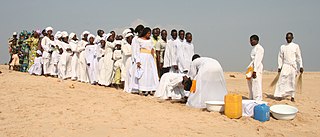
The Celestial Church of Christ is an African Initiated Church founded by Samuel Bilewu Joseph Oshoffa on 29 September 1947 in Porto-Novo, Benin. It is mainly located in Africa and in the Afro-descendant communities in the world, particularly in Benin and Nigeria.

Koutammakou, the Land of the Batammariba is a cultural landscape designated in 2004 as a UNESCO World Heritage Site in northern Togo. The area features traditional mud tower-houses which remain the preferred style of living. The traditional mud houses are known as a national symbol of Togo. Many of the mud houses have two floors and some of them have a flat roof.
Adélaïde H. Edith Bignon Fassinou is a Beninese writer and Benin's General Secretary for UNESCO. She has written four novels in French. Her married name is Allagbada.

Jean-Marc Ela was a Cameroonian sociologist and theologian. Working variously as a diocesan priest and a professor, Ela was the author of many books on theology, philosophy, and social sciences in Africa. His most famous work, African Cry has been called the "soundest illustration" of the spirit of liberation theology in sub-Saharan Africa. His works are widely cited as exemplary of sub-Saharan African Christian theology for their focus on contextualisation and their emphasis on community-centered approaches to theology.
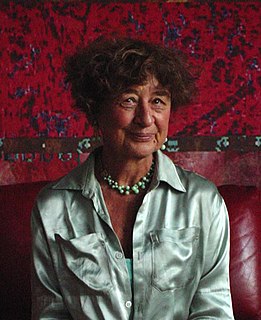
Christine Buci-Glucksmann is a French philosopher and Professor Emeritus from University of Paris VIII specializing in the aesthetics of the Baroque, Japan and computer art. Her best-known work in English is Baroque Reason: The Aesthetics of Modernity.
Marcel Amondji is the pseudonym of an Ivorian writer. After spending his childhood in Bingerville, he travelled to France to pursue higher education. Since 1961, Amondji has lived abroad, writing on politics in Côte d'Ivoire.

The coat of arms of the city of Paris, in its current form, dates back to 1358. On the coat of arms, the represented vessel is the symbol of the powerful corporate body of the Marchands de l'eau, dating back to the Middle Ages. The city motto, Fluctuat nec mergitur is equally a reference to this boat.
Noel Dossou-Yovo was a Beninese academic. The holder of various degrees, he was head of African Studies at the National University of Benin in Cotonou. Dossou-Yovo held the positions of Deputy Director at the Center of African Family Studies in Nairobi from 1983 to 1996. From 1995 to 1996 he was Senior Advisor for African and Social Affairs of the Head of State in his home country. He was also a prolific writer, penning many articles in academic journals and those at conferences in Africa, Asia, Europe, and the United States. He died on May 5, 2011. He was 67 years old.
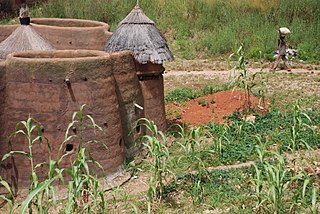
The Tammari people, or Batammariba, also known as Somba, are an Oti–Volta-speaking people of the Atakora Department of Benin and neighboring areas of Togo, where they go by the name of Taberma. They are famous for their two-story fortified houses, known as Tata Somba, in which the ground floor is used for housing livestock at night, internal alcoves are used for cooking, and the upper floor contains a rooftop courtyard and is used for drying grain, sleeping quarters, and granaries. These evolved by adding an enclosing roof to the clusters of huts joined by a connecting wall that are typical of Gur-speaking areas of West Africa. The Tammari are mostly animist by religion. Their language is in the Gur family.
The National League of Patriotic Youth was a political movement in Dahomey. The organization was founded in 1967. Its followers were nicknamed ligueurs.
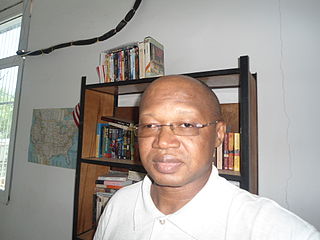
Marie-Ange Somdah is a Burkinabe poet and writer based in Boston. He is also known for his works in international development with organizations such as IFESH.
The Tém an ethnic group of Togo, but also found in Benin and Ghana. There is reported to be about 417,000 of the Tém, with 339,000 in Togo, 60,000 in Ghana and 18,000 in Benin. They speak the Tem language.
The following is a timeline of the history of the city of Cotonou, Benin.

Erwan Dianteill is a French sociologist and anthropologist, graduate of the Ecole Normale Supérieure Paris-Saclay, holder of the aggregation in the Social Sciences, Doctor of Sociology and professor of Cultural and Social anthropology at the Sorbonne. He is also a Senior member of the Institut Universitaire de France since 2012, and Non-Resident Fellow of the WEB DuBois Research Institute at Harvard University since 2017.

Tahar Bekri is a Paris-based Tunisian poet and literary critic.
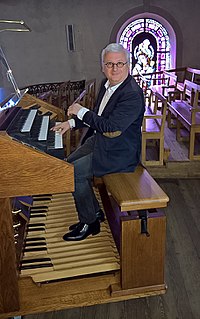
Éric Humbertclaude is a French musician, organist, contemporary composer, writer and essayist, musicologist, researcher specializing in contemporary music and pipe organ music.
Myriam Ben (1928–2001) was an Algerian activist, militant, novelist, poet, and painter. She was born Marylise Ben Haïm in Algiers on October 10, 1928. Her father was a communist who had served in the French army during the October revolution, and her mother was a musician. She was raised in a non-religious household, recalling later that she was seven years old before she realized her family was Jewish. In 1940, the Vichy French regime revoked the 19th century Crémieux Decree, so depriving Jewish Algerians of citizenship and resulting in Ben's expulsion from the lycée she had been attending in Algiers. She briefly attended a Jewish school, but completed her education at home due to her father's opposition to Zionism.












